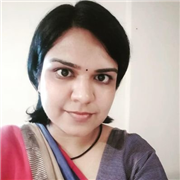
Cheshta Yadav
IAS Officer
North-West Delhi DM
New Delhi: Serving the underserved is an important area which tops the priorities of India’s ‘Steel Frame.’ It is their sincere endeavour to reach out to the poorest among the poor and deal with all as one among equals so that no one is deprived of the benefits of good governance. “Last mile reach is the most important thing for any governance paradigm,” said Cheshta Yadav, 2014 batch IAS officer, currently posted as DM North-West Delhi in an exclusive interview to Rajeev R of Bureaucrats India. Read The Full Interview Here:
In North West Delhi, you have laid a lot of emphasis on making women financially empowered. Three SHGs were formed and given sanitary napkins for retailing with the help of DAV Society. It must have been an easier said than done task. What are future plans?
In North West Delhi- we have planned a lot of things especially for women. Apart from Self-Help Group (SHG) formations, we have collaborated with legal service authority for legal camps. We renovated a few Anganwadi centres and provided them with furniture in the Mangolpuri area.
Similarly, you have set up a Public Facilitation Booth-cum-Help Desk to enhance public service delivery. It is a one stop centre for all the needs of the citizens. How is the people’s feedback? What was the catalyst that you thought of having this facility?
We also aim to increase the comfort of citizens. Last mile reach is the most important thing for any governance paradigm. Facilitation booth is a guiding desk which explains the process in detail and helps citizens to get their work done. It was also created to eliminate middlemen.
Recently, you shared on your Twitter handle three pictures of a library in Longding District in Arunachal Pradesh. Delightedly, you referred to the ‘girl gang’ busy with books. Tell us about this library, which seems to be so close to your heart!
We found a dilapidated hall in Longding town and converted it into a Reading cum library hall. Group of students who had come back to villages from cities during the lockdown helped us with this. Longding is an insurgency prone district infamous for youth being involved with drugs and guns. This initiative was the most satisfying project in my tenure as DC. Currently it has Wi-Fi facilities and seating arrangements with competitive books.
Over the years, the dynamics of governance have changed. Indian Civil Services have also undergone a great churn. It is quite diverse now. What is your take?
Yes, I agree. We are adapting ourselves day by day and hoping to live up to the expectations of citizens and the country as a whole.
It is said the idea of good governance has picked up steam in our country. Our bureaucracy is working really hard to improve people’s ease of life. People’s hesitancy to meet officers has also reduced over the years. Do you think that the gap between people and bureaucracy is reducing fast?
Very much! Social media has drastically blurred the gap. It is a good change.
How challenging and fulfilling do you find the job of a woman IAS officer? Would you like to share some of your great career moments so far from Arunachal Pradesh to Delhi, our national capital?
It has so far been an extremely satisfying tenure. As ADC and later DC, I got an opportunity to oversee both infrastructural works as well as welfare schemes in AP. High point was to oversee completion of Highway in District Longding which improved connectivity enormously.
Tell us about your tryst as a young bureaucrat with the challenges of Covid-19 pandemic. It was an unprecedented situation. India’s ‘Steel Frame’ rose to the occasion with all dynamism and conviction.
Covid-19 brought unprecedented challenges for us. As DM both in Arunachal Pradesh and Delhi, we are constantly on our toes in implementing various measures to contain the virus. Bureaucracy has literally stood up to every new challenge that Covid-19 has brought and even continues to bring.
Social media is fast becoming a reliable fulcrum to stay connected with the people and get their feedback as well. It is being seen as an agent for positive change. What is your take?
Social media if used responsibly is a powerful tool for information dissemination especially in Delhi. We have tried to use it in the same way in our district.
Any specific incident which you would like to share with the audience where you realized the importance of social media platforms and which would have given you a great sense of professional fulfillment?
No particular instance but we try to respond and solve problems received on SM as far as we can.
From Miranda House to LBSNAA – Tell us the genesis of the journey and the challenges you would have faced in the course of chasing your dream!
It has been a great journey. Preparation time was tough and unpredictable but I am glad that I made it through with the blessings of my parents and elders.
|